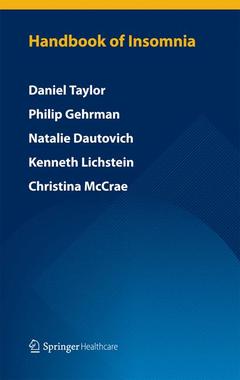Description
Handbook of Insomnia, 2014
Authors: Taylor Daniel, Gehrman Philip, D Dautovich Natalie, L Lichstein Kenneth, S McCrae Christina
Language: English
Subjects for Handbook of Insomnia:
Keywords
Circadian rhythms; Insomnia; Psychiatry; Psychology; Sleep disorders
42.19 €
In Print (Delivery period: 15 days).
Add to cart66 p. · 12.7x20.1 cm · Paperback
Description
/li>Contents
/li>Biography
/li>Comment
/li>
Concise overview of the etiology, diagnosis, assessment and treatment of insomnia
Comprehensive coverage of treatment approaches in insomnia and related sleep disorders, including recent advances and drug developments
Includes the most up-to-date clinical information, including major international guidelines such as the International Classification of Sleep Disorders and the recently-updated DSM-5
Includes supplementary material: sn.pub/extras
These books may interest you

Clinical Handbook of Insomnia 116.04 €

Handbook of Sleep Disorders 74.82 €


